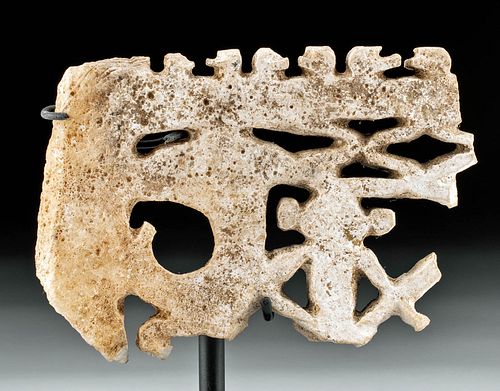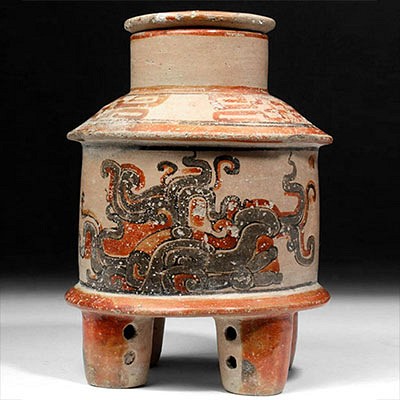19th C. Solomon Islands Clamshell Barava Carving
Lot 303
About Seller
Artemis Fine Arts
686 S Taylor Ave, Ste 106
Louisville, CO 80027
United States
Selling antiquities, ancient and ethnographic art online since 1993, Artemis Gallery specializes in Classical Antiquities (Egyptian, Greek, Roman, Near Eastern), Asian, Pre-Columbian, African / Tribal / Oceanographic art. Our extensive inventory includes pottery, stone, metal, wood, glass and textil...Read more
Estimate:
$2,200 - $3,300
Absentee vs Live bid
Two ways to bid:
- Leave a max absentee bid and the platform will bid on your behalf up to your maximum bid during the live auction.
- Bid live during the auction and your bids will be submitted real-time to the auctioneer.
Bid Increments
| Price | Bid Increment |
|---|---|
| $0 | $25 |
| $300 | $50 |
| $1,000 | $100 |
| $2,000 | $250 |
| $5,000 | $500 |
| $10,000 | $1,000 |
| $20,000 | $2,500 |
| $50,000 | $5,000 |
| $100,000 | $10,000 |
| $200,000 | $20,000 |
About Auction
By Artemis Fine Arts
Jul 22, 2021
Set Reminder
2021-07-22 10:00:00
2021-07-22 10:00:00
America/New_York
Bidsquare
Bidsquare : Summer Antiquities & Ethnographic Art Auction
https://www.bidsquare.com/auctions/artemis-gallery/summer-antiquities-ethnographic-art-auction-7245
Travel around the world and back in time...and be amazed at the treasures you will find! Antiquities from Egypt, Greece, Italy and the Near East, Asian, Pre-Columbian, African / Tribal / Oceanic, Native American, Spanish Colonial, Russian Icons, Fossils, Fine Art, much more! Artemis Fine Arts info@artemisgallery.com
Travel around the world and back in time...and be amazed at the treasures you will find! Antiquities from Egypt, Greece, Italy and the Near East, Asian, Pre-Columbian, African / Tribal / Oceanic, Native American, Spanish Colonial, Russian Icons, Fossils, Fine Art, much more! Artemis Fine Arts info@artemisgallery.com
- Lot Description
Oceania, Melanesia, Solomon Islands, Choiseul Island, ca. 19th century or earlier. A fascinating barava (shell plaque) intricately carved from the shell of a giant clam. This example comes from the Solomon Islands, where this artform reached its apex. Note the ornate openwork of this barava, replete with abstract representations of stylized figures – six profile heads along the upper periphery, several with abstract bent legs, and a large simian-like creature below with exaggerated ears and limbs akimbo. Size: 4.25" W x 2.875" H (10.8 cm x 7.3 cm); 4.125" H (10.5 cm) on included custom stand.
See a similar example at the Metropolitan Museum of Art on view in Gallery 354 (accession number 1979.206.1424). According to the Met’s curatorial description of this piece, "Objects fashioned from the hard marble-like shell of the giant clam are prized by many Melanesian peoples. The art of working giant-clam shell reached its apogee in the Solomon Islands. The most complex clam shell objects were barava, ornate openwork plaques created in the western Solomon Islands. The designs on some barava are geometric, but many include stylized human figures interspersed with forms that resemble faces, shown with spiral eyes and grinning mouths filled with minute teeth. Barava appear to have been associated with burial places and were reportedly used to adorn structures housing the skulls of prominent men or slain enemies or placed on graves. In the past, some barava formed part of vovoso, powerful charms carried in war canoes during headhunting expeditions to protect the crew and ensure success."
CF: Waite, Deborah. Art of the Solomon Islands: From the Collection of the Barbier-Müller. Geneva: Musee Barbier-Mueller, 1983.
Kjellgren, Eric. Oceania: Art of the Pacific Islands in the Metropolitan Museum of Art. New York and New Haven: The Metropolitan Museum of Art, 2007, no. 102, p. 173.
Provenance: private Hawaii, USA collection; ex Norman Hurst collection, prior to 2000
All items legal to buy/sell under U.S. Statute covering cultural patrimony Code 2600, CHAPTER 14, and are guaranteed to be as described or your money back.
A Certificate of Authenticity will accompany all winning bids.
PLEASE NOTE: Due to recent increases of shipments being seized by Australian & German customs (even for items with pre-UNESCO provenance), we will no longer ship most antiquities and ancient Chinese art to Australia & Germany. For categories of items that are acceptable to ship to Australia, please contact us directly or work with your local customs brokerage firm.
#153889Losses to peripheries as shown. Expected surface wear commensurate with age. Surface also graced with deposits as shown. Small label with old inventory number on verso.Condition
- Shipping Info
-
All shipping is handled in-house for your convenience. Your invoice from Artemis Gallery will include shipping calculation instructions. If in doubt, please inquire BEFORE bidding for estimated shipping costs for individual items.
-
- Buyer's Premium



 EUR
EUR CAD
CAD AUD
AUD GBP
GBP MXN
MXN HKD
HKD CNY
CNY MYR
MYR SEK
SEK SGD
SGD CHF
CHF THB
THB














